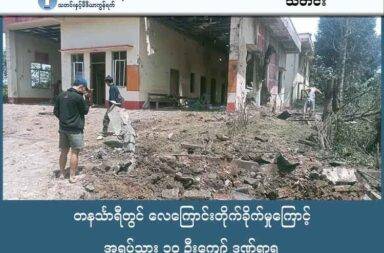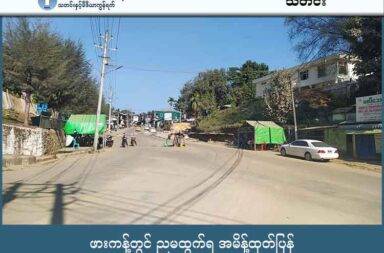‘Everything is Gone,’ Say Kachin Communities in Hpakant
A committee fighting for indigenous rights is calling on the government to take responsibility for the damage caused by the jade mining industry.
By NETWORK MEDIA GROUP (NMG)
Tuesday, August 13, 2019
A Hpakant-based civil society group has urged the government to pursue an agreement with indigenous communities before initiating jade mining projects in Hpakant, Kachin State.
The Indigenous People’s Protection Committee (Mungnawk Hkawng Uru Rudi Ruhpang Ga in the Jinghpaw dialect) said that their people have suffered because of business pursuits in Hpakant.
“There is nothing left in our area. There is nothing left in my rotating farmland area because they already have dug it up looking for jade stones,” Lamawng La Tawng, a leader of the Indigenous People’s Protection Committee, told NMG. “What should we do in the future? How can we survive? Our area usually has plenty of trees and animals. Now everything is gone.”
Lamawng La Tawng said that homes in his community have cracked because of the explosions nearby from dynamite, as companies search for jade within local mountains. Sources of drinking water have also become polluted.
“Who is going to take responsibility for it?” he asked.
Jade mining companies have introduced the use of heavy machinery and engaged in excessive extraction of jade in Hpakant in recent years, causing natural disasters including flooding and landslides.
Lamawng La Tawng has demanded greater respect for indigenous rights to the area and the maintenance of the forests, farmlands, and natural resources in Hpakant.
“We want to reclaim our lost rights. The situation is really bad. Our area will be completely gone in the next five to 10 years. If situation keeps going like this, we will have no hope left. Our area is completely damaged,” he explained.
The Indigenous People’s Protection Committee is also concerned about population shifts in the Hpakant area as people from across Burma move there to work in the mines and eke out a living as jade-pickers, and the Kachin feel that they are becoming a minority.
“We are demanding to the government that we don’t want jade stones worth millions of dollars. What we really want is to reclaim our lost land and farmland,” Lamawng La Tawng said. “Originally, indigenous people made up the few thousand people living in the Hpakant area. Now hundreds of thousands of workers have migrated to the area.”
Ze Zawng, general secretary of the Kachin National Congress Party, said that he is worried that the authorities will settle the workers on lands seized by the government in the Hpakant area under the controversial Vacant, Fallow and Virgin land management law.
“This plan could cause more conflicts in the area,” he said.
The Hpakant branch of the Kachin State People’s Party (KSPP), a party formed earlier this year through a merger of Kachin parties that were once political rivals, released a statement to mark the International Day of the World’s Indigenous People on August 9.
“Indigenous people should get full recognition of their indigenous rights with dignity. Indigenous people’s rights are one of the important factors in building a genuine federal democratic Union. The KSPP’s Hpakant branch will work together with indigenous people to fulfill their rights,” the party said in its statement.
Indigenous people in Hpakant held the “Our Land, Our Life” event to celebrate International Day of the World’s Indigenous People at the Maw-one Independent Stone-pillar Park in Hpakant town on August 9.


